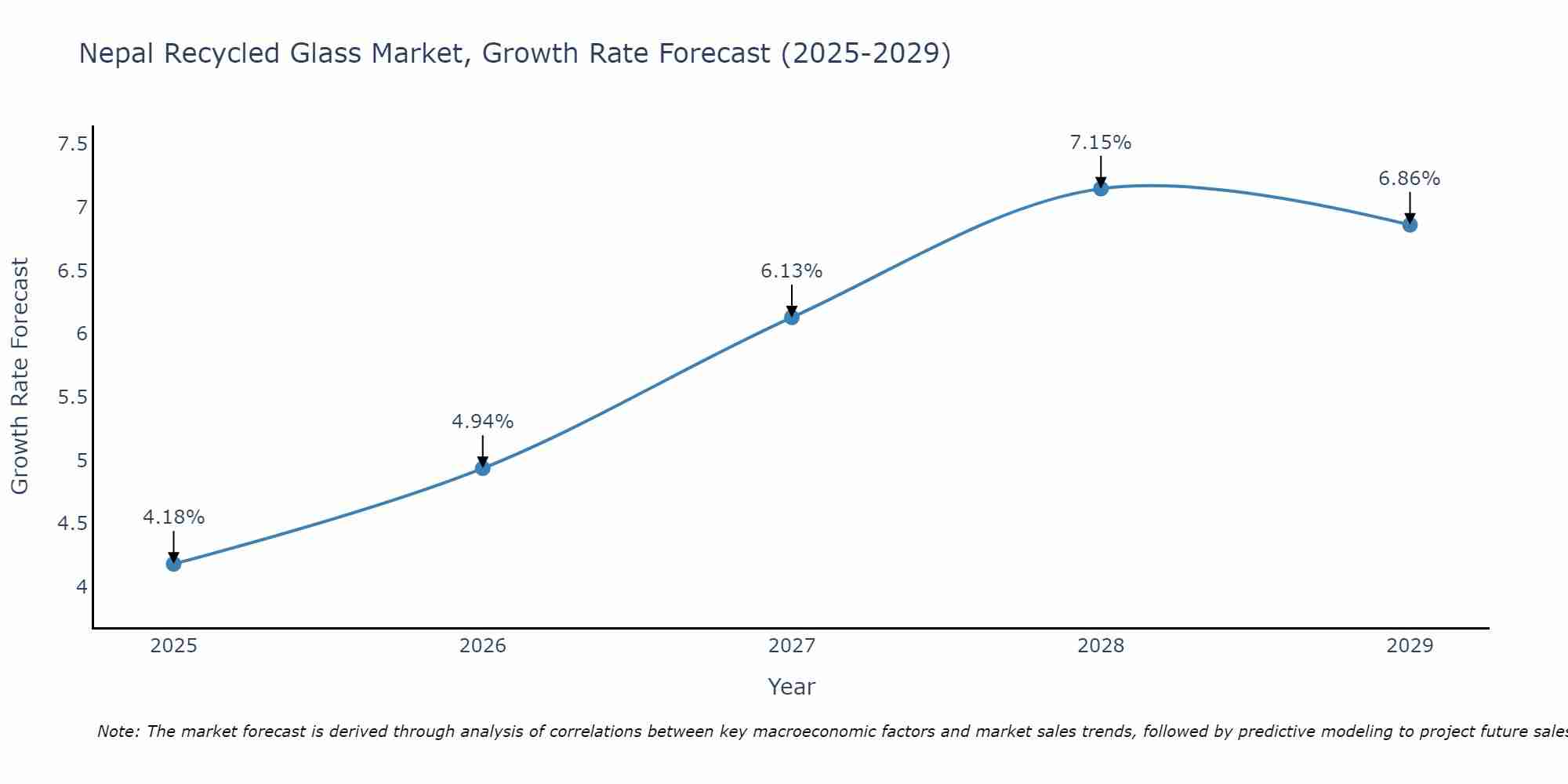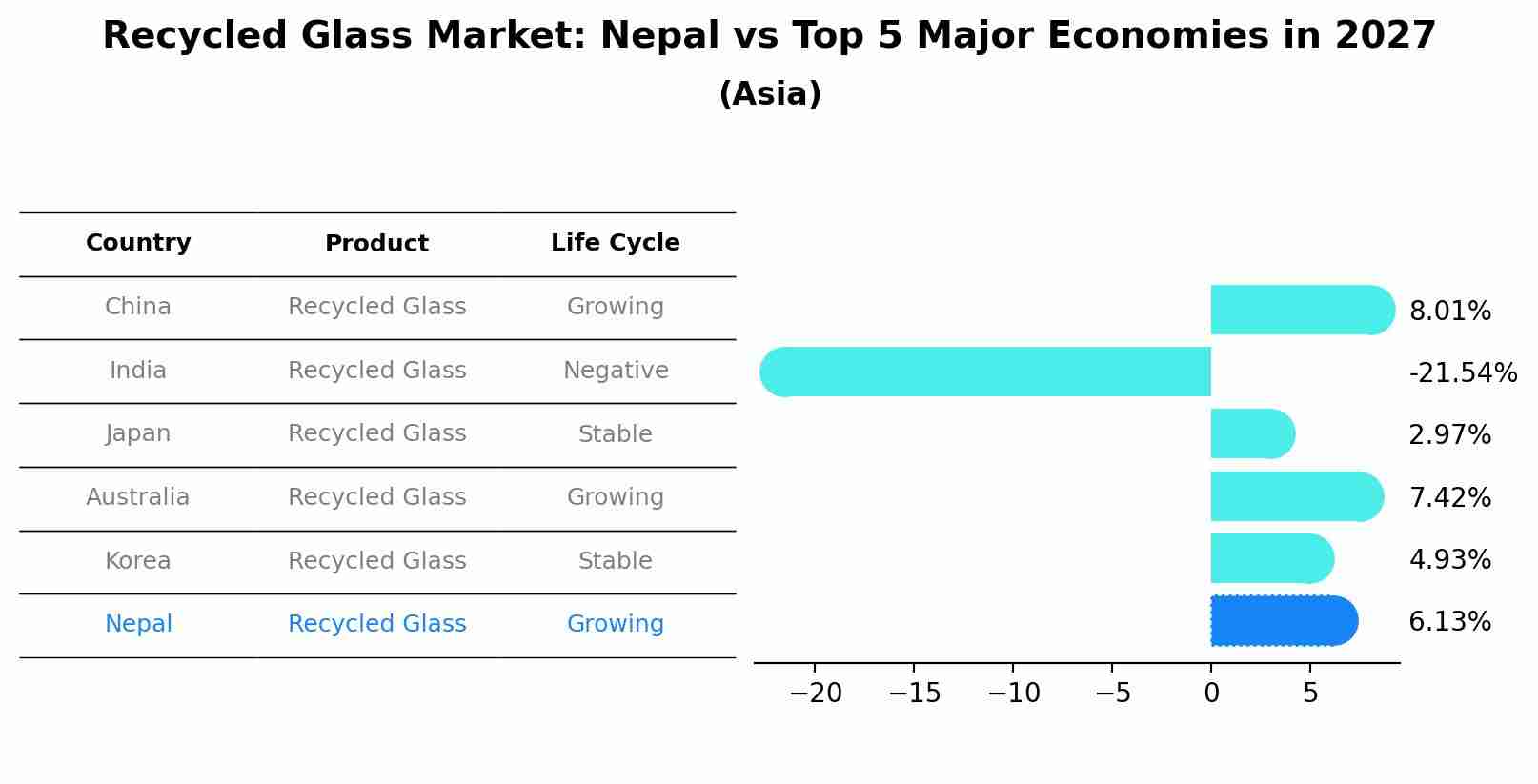Nepal Recycled Glass Market (2025-2031) Outlook | Forecast, Trends, Revenue, Analysis, Value, Size, Companies, Growth, Industry & Share
| Product Code: ETC355716 | Publication Date: Aug 2022 | Updated Date: Aug 2025 | Product Type: Market Research Report | |
| Publisher: 6Wresearch | Author: Shubham Deep | No. of Pages: 75 | No. of Figures: 35 | No. of Tables: 20 |
Nepal Recycled Glass Market Size Growth Rate
The Nepal Recycled Glass Market is projected to witness mixed growth rate patterns during 2025 to 2029. The growth rate begins at 4.18% in 2025, climbs to a high of 7.15% in 2028, and moderates to 6.86% by 2029.

Recycled Glass Market: Nepal vs Top 5 Major Economies in 2027 (Asia)
By 2027, the Recycled Glass market in Nepal is anticipated to reach a growth rate of 6.13%, as part of an increasingly competitive Asia region, where China remains at the forefront, supported by India, Japan, Australia and South Korea, driving innovations and market adoption across sectors.

Nepal Recycled Glass Market Synopsis
The Nepal recycled glass market is steadily growing as awareness of environmental sustainability increases in the country. The demand for recycled glass products is driven by the government`s initiatives to promote recycling and reduce waste. Local artisans and small businesses are also contributing to the market by creating unique and eco-friendly glassware and decorative items from recycled glass materials. The market offers a range of products such as glass bottles, vases, ornaments, and home décor items made from recycled glass, catering to both domestic and international consumers. With an emphasis on promoting eco-friendly practices and supporting local artisans, the Nepal recycled glass market is poised for further expansion in the coming years.
Nepal Recycled Glass Market Trends
In the Nepal Recycled Glass Market, there is a growing trend towards sustainable and eco-friendly alternatives to traditional glass products. Consumers are increasingly seeking out recycled glass items such as glassware, vases, and home decor pieces due to their environmental benefits and unique aesthetic appeal. Artisans and manufacturers in Nepal are leveraging this trend by producing a wide range of recycled glass products that cater to both local and international markets. Additionally, there is a rising interest in upcycling glass waste into innovative and functional products, reflecting a shift towards a circular economy mindset within the industry. Overall, the Nepal Recycled Glass Market is experiencing a surge in demand for eco-conscious and visually striking glassware options.
Nepal Recycled Glass Market Challenges
The Nepal Recycled Glass Market faces several challenges, including limited awareness and understanding of the benefits of using recycled glass products among consumers and businesses. The lack of infrastructure and technology for efficient collection, processing, and recycling of glass waste also hinders market growth. Additionally, inconsistent government regulations and policies related to waste management and recycling further complicate the market landscape. Limited access to financing and investment opportunities for businesses in the recycled glass sector poses another challenge, making it difficult to scale operations and meet market demand. Overcoming these challenges will require collaboration among stakeholders, increased public education and awareness initiatives, improved infrastructure, and supportive government policies to foster a more sustainable and thriving recycled glass market in Nepal.
Nepal Recycled Glass Market Investment Opportunities
The Nepal recycled glass market presents promising investment opportunities due to the increasing demand for sustainable and eco-friendly products. With a growing awareness of environmental issues, there is a rising trend towards using recycled materials in various industries, including construction, packaging, and consumer goods. Investing in facilities that collect, process, and manufacture recycled glass products can capitalize on this market trend. Furthermore, the government of Nepal has been implementing policies to promote recycling and sustainability, creating a supportive regulatory environment for businesses in the recycled glass sector. Partnering with local communities and organizations to source raw materials can also enhance the social impact of investments in this market. Overall, investing in the Nepal recycled glass market offers the potential for both financial returns and positive environmental outcomes.
Jordan Agar Market Government Policies
The government of Nepal has implemented various policies to support and promote the recycled glass market in the country. One of the key policies is the Solid Waste Management Act, which emphasizes the importance of recycling and proper waste disposal. Additionally, the government offers incentives and subsidies to businesses and individuals involved in glass recycling, such as tax breaks and financial assistance. Furthermore, there are regulations in place regarding the collection, sorting, and processing of recycled glass to ensure environmental sustainability and quality standards. Overall, the government`s policies aim to encourage the growth of the recycled glass market in Nepal by creating a supportive regulatory environment and providing incentives for stakeholders in the industry.
Nepal Recycled Glass Market Future Outlook
The Nepal recycled glass market is expected to witness steady growth in the coming years due to increasing awareness about environmental sustainability and the government`s emphasis on promoting recycling initiatives. With a growing trend towards eco-friendly products and a shift towards circular economy practices, the demand for recycled glass is projected to rise. Moreover, the construction sector`s inclination towards using sustainable materials, including recycled glass, in building projects is likely to further drive market growth. Manufacturers focusing on innovation in recycled glass products and investing in efficient recycling processes are also anticipated to contribute to the market`s expansion. Overall, the future outlook for the Nepal recycled glass market appears promising, with opportunities for growth and development in the sustainable materials industry.
Key Highlights of the Report:
- Nepal Recycled Glass Market Outlook
- Market Size of Nepal Recycled Glass Market, 2024
- Forecast of Nepal Recycled Glass Market, 2031
- Historical Data and Forecast of Nepal Recycled Glass Revenues & Volume for the Period 2021 - 2031
- Nepal Recycled Glass Market Trend Evolution
- Nepal Recycled Glass Market Drivers and Challenges
- Nepal Recycled Glass Price Trends
- Nepal Recycled Glass Porter's Five Forces
- Nepal Recycled Glass Industry Life Cycle
- Historical Data and Forecast of Nepal Recycled Glass Market Revenues & Volume By Product for the Period 2021 - 2031
- Historical Data and Forecast of Nepal Recycled Glass Market Revenues & Volume By Crushed Glass for the Period 2021 - 2031
- Historical Data and Forecast of Nepal Recycled Glass Market Revenues & Volume By Cullets for the Period 2021 - 2031
- Historical Data and Forecast of Nepal Recycled Glass Market Revenues & Volume By Glass Powder for the Period 2021 - 2031
- Historical Data and Forecast of Nepal Recycled Glass Market Revenues & Volume By Application for the Period 2021 - 2031
- Historical Data and Forecast of Nepal Recycled Glass Market Revenues & Volume By Glass Bottle & Containers for the Period 2021 - 2031
- Historical Data and Forecast of Nepal Recycled Glass Market Revenues & Volume By Flat Glass for the Period 2021 - 2031
- Historical Data and Forecast of Nepal Recycled Glass Market Revenues & Volume By Fiber Glass for the Period 2021 - 2031
- Historical Data and Forecast of Nepal Recycled Glass Market Revenues & Volume By Highway Beads for the Period 2021 - 2031
- Historical Data and Forecast of Nepal Recycled Glass Market Revenues & Volume By Abrasives for the Period 2021 - 2031
- Historical Data and Forecast of Nepal Recycled Glass Market Revenues & Volume By Fillers for the Period 2021 - 2031
- Historical Data and Forecast of Nepal Recycled Glass Market Revenues & Volume By Others for the Period 2021 - 2031
- Nepal Recycled Glass Import Export Trade Statistics
- Market Opportunity Assessment By Product
- Market Opportunity Assessment By Application
- Nepal Recycled Glass Top Companies Market Share
- Nepal Recycled Glass Competitive Benchmarking By Technical and Operational Parameters
- Nepal Recycled Glass Company Profiles
- Nepal Recycled Glass Key Strategic Recommendations
Frequently Asked Questions About the Market Study (FAQs):
- Single User License$ 1,995
- Department License$ 2,400
- Site License$ 3,120
- Global License$ 3,795
Search
Related Reports
- ASEAN and Thailand Brain Health Supplements Market (2025-2031) | Strategy, Consumer Insights, Analysis, Investment Trends, Opportunities, Growth, Size, Share, Industry, Revenue, Segments, Value, Segmentation, Supply, Forecast, Restraints, Outlook, Competition, Drivers, Trends, Demand, Pricing Analysis, Competitive, Strategic Insights, Companies, Challenges
- ASEAN Bearings Market (2025-2031) | Strategy, Consumer Insights, Analysis, Investment Trends, Opportunities, Growth, Size, Share, Industry, Revenue, Segments, Value, Segmentation, Supply, Forecast, Restraints, Outlook, Competition, Drivers, Trends, Demand, Pricing Analysis, Competitive, Strategic Insights, Companies, Challenges
- Europe Flooring Market (2025-2031) | Outlook, Share, Industry, Trends, Forecast, Companies, Revenue, Size, Analysis, Growth & Value
- Saudi Arabia Manlift Market (2025-2031) | Outlook, Size, Growth, Trends, Companies, Industry, Revenue, Value, Share, Forecast & Analysis
- Uganda Excavator, Crane, and Wheel Loaders Market (2025-2031) | Strategy, Consumer Insights, Analysis, Investment Trends, Opportunities, Growth, Size, Share, Industry, Revenue, Segments, Value, Segmentation, Supply, Forecast, Restraints, Outlook, Competition, Drivers, Trends, Demand, Pricing Analysis, Competitive, Strategic Insights, Companies, Challenges
- Rwanda Excavator, Crane, and Wheel Loaders Market (2025-2031) | Strategy, Consumer Insights, Analysis, Investment Trends, Opportunities, Growth, Size, Share, Industry, Revenue, Segments, Value, Segmentation, Supply, Forecast, Restraints, Outlook, Competition, Drivers, Trends, Demand, Pricing Analysis, Competitive, Strategic Insights, Companies, Challenges
- Kenya Excavator, Crane, and Wheel Loaders Market (2025-2031) | Strategy, Consumer Insights, Analysis, Investment Trends, Opportunities, Growth, Size, Share, Industry, Revenue, Segments, Value, Segmentation, Supply, Forecast, Restraints, Outlook, Competition, Drivers, Trends, Demand, Pricing Analysis, Competitive, Strategic Insights, Companies, Challenges
- Angola Excavator, Crane, and Wheel Loaders Market (2025-2031) | Strategy, Consumer Insights, Analysis, Investment Trends, Opportunities, Growth, Size, Share, Industry, Revenue, Segments, Value, Segmentation, Supply, Forecast, Restraints, Outlook, Competition, Drivers, Trends, Demand, Pricing Analysis, Competitive, Strategic Insights, Companies, Challenges
- Israel Intelligent Transport System Market (2025-2031) | Strategy, Consumer Insights, Analysis, Investment Trends, Opportunities, Growth, Size, Share, Industry, Revenue, Segments, Value, Segmentation, Supply, Forecast, Restraints, Outlook, Competition, Drivers, Trends, Demand, Pricing Analysis, Competitive, Strategic Insights, Companies, Challenges
- Uganda Precast and Aggregate Market (2025-2031) | Strategy, Consumer Insights, Analysis, Investment Trends, Opportunities, Growth, Size, Share, Industry, Revenue, Segments, Value, Segmentation, Supply, Forecast, Restraints, Outlook, Competition, Drivers, Trends, Demand, Pricing Analysis, Competitive, Strategic Insights, Companies, Challenges
Industry Events and Analyst Meet
Our Clients
Whitepaper
- Middle East & Africa Commercial Security Market Click here to view more.
- Middle East & Africa Fire Safety Systems & Equipment Market Click here to view more.
- GCC Drone Market Click here to view more.
- Middle East Lighting Fixture Market Click here to view more.
- GCC Physical & Perimeter Security Market Click here to view more.
6WResearch In News
- Doha a strategic location for EV manufacturing hub: IPA Qatar
- Demand for luxury TVs surging in the GCC, says Samsung
- Empowering Growth: The Thriving Journey of Bangladesh’s Cable Industry
- Demand for luxury TVs surging in the GCC, says Samsung
- Video call with a traditional healer? Once unthinkable, it’s now common in South Africa
- Intelligent Buildings To Smooth GCC’s Path To Net Zero













